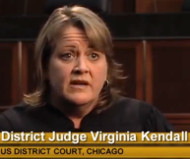12/23/2015
Federal Judge Limits Testimony In Redflex Bribery TrialRedflex corruption trial will stick closely to events in Chicago, Illinois.

US District Judge Virginia M. Kendall said what government prosecutors wanted to hear on Tuesday. Former Chicago, Illinois Deputy Transportation Commissioner John Bills is on trial for receiving hundreds of thousands in cash and benefits from Redflex Traffic Systems in return for his help in securing the massive $100 million photo ticketing contract, and he will have a harder time defending himself.
Judge Kendall essentially granted all of the government's motions designed to limit the scope of the trial to ensure that it does not get bogged down by discussions of irrelevant side issues, such as Redflex bribery efforts in Louisiana that have not yet resulted in any criminal charges. Representing Bills, attorney Nishay K. Sanan explained the relevance of what Redflex did in the Pelican State.
"In Jefferson Parrish, [Redflex bagman Martin] O'Malley put [Redflex Executive Vice President Aaron] Rosenberg in contact with a lobbyist whose job it was to assist in obtaining red light camera contracts," Sanan explained. "Similar to the instant situation, the lobbyist would be paid a percentage of the revenue generated. The government acknowledges that the Redflex contract in Jefferson Parrish was ultimately suspended, but provides no details as to why. Lastly, the government states that Rosenberg 'does not know of any quid pro quo or agreement involved in the Jefferson Parrish contract.'"
The idea is that if charges were not filed in Jefferson Parish, they should not have been filed in Chicago. The defense will argue that the government's arguments essentially amount to a discussion of corruption between corrupt employees of Redflex, without any direct evidence implicating Bills.
"Rather than demonstrating that Bills took part in any conspiracy, a brief read of the government's proffered evidence demonstrates that the only conspiracy in this matter is solely among employees of Redflex," Sanan wrote. "It seems as though Mr. Bills had no involvement whatsoever in Redflex's attempts at securing a contract with the city of Chicago."
The trial will not discuss a taped conversation between Bills and Rosenberg made four months after Bills learned that he was the subject of a federal investigation. On the tape, Bills made sure to tell Rosenberg on the phone that he was not involved in bribery. Bills had previously told O'Malley that he knew Rosenberg was wired. Federal prosecutors explained that the tape proves nothing, and that Rosenberg "played along" with Bills.
"Rosenberg, as part of cooperation with the FBI, engaged Bills about getting on the 'same page' and getting their 'stories straight,' and in doing so, went along with Bills' narrative by agreeing he did not pay bribes," US Attorney Zachary T. Fardon wrote. "In that context, Rosenberg's agreement is not a prior inconsistent statement, nor is it probative of his credibility."
Bills wanted the tapes aired in court as essential to his right to a fair trial.
"No one but the government has determined that the statements included in the two phone calls were exculpatory," Sanan argued. "Rather, the government prefers to usurp the role of this court and the jury, and make evidentiary determinations to bar introduction of two recordings that do not support the government's case."
Though Judge Kendall sided with the government, she expressed a willingness to be flexible and allow Bills to re-raise the issue at trial "if a basis presents itself."


